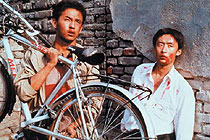|
|
|
|
Beijing
Bicycle
|
 |
|
It is easy to get the impression, especially from surfing the Internet, that contemporary Asian cinema is comprised solely of extravagant action films, fantasies, horror movies, comedy and erotica. Global film culture has evolved at a rapid rate over the past twenty years. We must be grateful that there is a now a vast and receptive audience open to these popular forms of Asian cinema that explore and explode generic models. What still suffers, however, is authentic Asian art cinema. Beyond SBS television and the various film festivals, we in Australia see little of the work by masters of Hou Hsaio-hsien, Tsai Ming-liang and Edward Yang, or such outstanding individual films as Platform (2000). In the Australian context of movie distribution, it has been fascinating to observe the "Silk Screen" experiment undertaken by Columbia TriStar. Testing the market, the series has showcased a range of film types, from satirical comedy (Shower, 1999) and extravagant action (Time and Tide, 2001) to whimsical character portraits (The Vertical Ray of the Sun, 2001) and slick nostalgia (Shadow Magic, 2000). While Crouching Tiger, Hidden Dragon (2000) has so far scored the biggest success of the series, a bona fide art title like Takeshi Kitano's Kikujiro (1999) has encountered resistance or indifference. But Kikujiro is a relatively easy-to-consume entertainment alongside the more rigorous and demanding masterpieces from the contemporary Asian scene. Wang Xiaoshuai's Beijing Bicycle is no masterpiece, but at least it takes us closer to the heart of the kind of Asian cinema we are generally not seeing in Australia. It is the first of a series of six films collectively titled "Tales of Three Cities" (the other cities being Taipei and Hong Kong) under the guidance of the legendary producer and scholar Peggy Chiao. It has an affinity with the many 'city portrait' movies made around the globe in recent years (such as Wonderland [1999] and Magnolia [1999]), except that instead of tracing the meandering paths of a large sprawl of characters, it focuses on two men. These two lives are linked by only a bicycle. Guei (Cui Lin) is trying to establish himself in Beijing after moving from the country. The security of his job as a delivery boy is constantly threatened by misunderstandings, humiliations and vagaries of city life. When his bike is stolen, it is a catastrophe. Jian (Li Bin), on the other hand, is an irresponsible, sulky kid who lives for fun. For him and his mates, a bicycle is something to do spectacular 'wheelies' on, not a necessity for economic survival. The back and forth of one bicycle between these two different characters provides suspense, droll humour and a framework for sketching the social hierarchy of a city. Fans of the art cinema of another era will inevitably recall the gritty neo-realism of Vittorio De Sica's Bicycle Thieves (1948). Writer-director Wang Xiaoshuai (So Close to Paradise, 1999) shares the Italian post-war taste for location filming and naturalistic acting, but his contemporary brand of realism makes De Sica's style seems like Hollywood gloss in retrospect. While it tries to avoid defeatist pessimism, Beijing Bicycle is an unsentimental film. Like much Asian art cinema, it concentrates on 'dead moments' without overt drama, lack of communication between characters, and lines of narrative intrigue that deliberately lead somewhere anticlimactic or unspectacular. Due to the director's careful and patient style, the alleyways, apartments and rooftops of this city become characters on the same level as the people. And by stressing the material existence of Beijing, the film is able to show its chaos and contradictions, but also suggest how a more workable future could emerge. © Adrian Martin February 2002 |
![]()